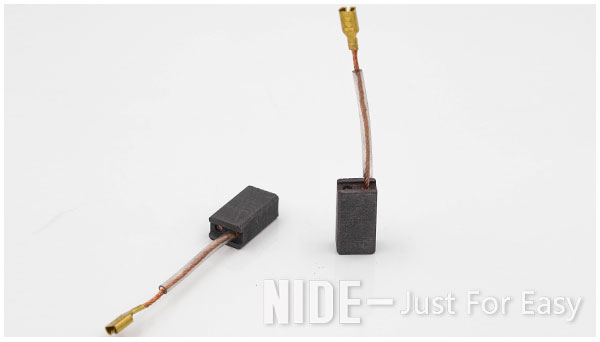Carbon brush is also called electric brush, as a kind of sliding contact, it is widely used in many electrical equipment. The carbon brush looks a bit like the rubber strip of a pencil, with wires leading out from the top, and the size is different. The carbon brush is the part of the brushed motor that is on the surface of the commutator. When the motor rotates, the electric energy is transmitted to the rotor coil through the commutator.

Carbon brush is a device for transmitting energy or signals between the fixed part and the rotating part of a motor or generator or other rotating machinery. The main materials are graphite, fat-impregnated graphite, and metal (copper, silver) graphite. It is generally made of pure carbon plus coagulant, and its appearance is generally square. It is stuck on the metal bracket, and there is a spring inside to press it tightly on the rotating shaft. When the motor rotates, the electric energy is transmitted to the coil through the commutator. Since its main component is carbon, it is called a carbon brush, which is easy to wear. It should be regularly maintained and replaced, and carbon deposits should be cleaned.

The function of the carbon brush is mainly to conduct electricity while rubbing against metal; it is not the same as metal-to-metal friction; when metal-to-metal friction is conductive; the friction force may increase; at the same time, the place where the handover may be sintered together; and Carbon brushes will not; because carbon and metal are two different elements; most of its uses are used in motors; there are various shapes; there are square and round, and so on.
Specific role:
1. To supply power to the rotor, the external current (excitation current) is added to the rotating rotor (input current) through the carbon brush.
2. Introduce the static charge on the large shaft to the ground (grounded carbon brush) through the carbon brush (output current).
3. Lead the large shaft (ground) to the protective device for rotor ground protection and measure the positive and negative voltage of the rotor to ground.
4. Change the direction of the current (in the commutator motor, the brush also plays the role of commutation).
Carbon brushes are suitable for all kinds of motors, generators, and axle machines. It has good reversing performance and long service life. The carbon brush is used on the commutator or slip ring of the motor. As a sliding contact body that leads and imports current, it has good electrical conductivity, thermal conductivity and lubricating performance, and has a certain mechanical strength and the instinct of commutation sparks. Almost all motors use carbon brushes, which are an important part of the motor. Widely used in various AC and DC generators, synchronous motors, battery DC motors, crane motor collector rings, various types of welding machines and so on. With the development of science and technology, the types of motors and the working conditions of use are becoming more and more diverse.



